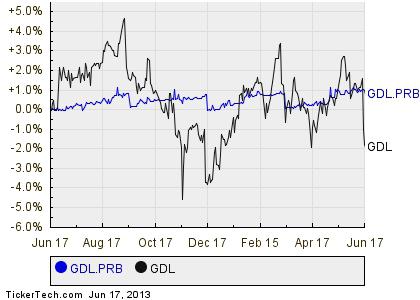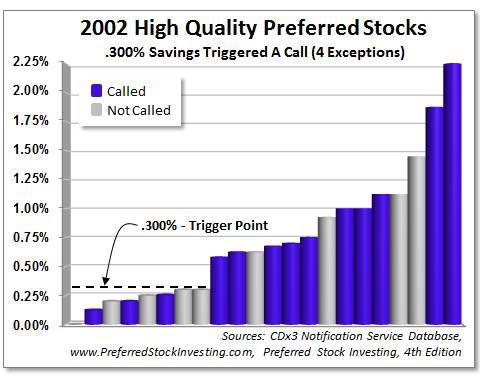Preferred Stocks That Pay High Dividends
Preferred Stocks
Investors can profit from studying to consider things from the company’s perspective. Most companies with strong credit rankings don’t issue preferred shares (except for regulatory causes), because the dividend funds are not tax-deductible.
Preferred stocks are technically inventory investments, standing behind debt holders in the credit score lineup. Preferred shareholders obtain choice over frequent stockholders, however in the case of a chapter all debt holders can be paid before preferred shareholders. And not like with common stock shareholders, who profit from any progress within the value of an organization, the return on preferred shares is a perform of the dividend yield, which may be either fixed or floating. For an investor, bonds are usually the safest approach to put money into a publicly traded company. Legally, interest funds on bonds must be paid before any dividends on most popular or common inventory.

Callable Preferred Stock
The nature of most popular stock offers one other motive for companies to problem it. With its common fixed dividend, preferred inventory resembles bonds with common curiosity payments. However, in contrast to bonds that are classified as a debt legal responsibility, most popular stock is considered an equity asset. Issuing most well-liked inventory provides an organization with a method of obtaining capital without rising the corporate’s overall stage of excellent debt. This helps keep the company’s debt to equity (D/E) ratio, an important leverage measure for investors and analysts, at a decrease, extra attractive degree.
A major difference from frequent stock is that preferred inventory comes with no voting rights. So when it comes time for an organization to elect a board of administrators or vote on any form of company coverage, most popular shareholders don’t have any voice in the way forward for the corporate. In truth, preferred stock functions equally to bonds since with most well-liked shares, investors are normally assured a fixed dividend in perpetuity. Thedividend yieldof a preferred stock is calculated as the greenback amount of a dividend divided by the price of the inventory. This is often based mostly on the par value earlier than a preferred inventory is obtainable.
This is engaging to most well-liked stock holders because they’re entitled to the regular stream of dividends, plus they will get pleasure from appreciation in value if the corporate’s frequent inventory rises. Preferred stocks are a hybrid of sorts, as they’ve features of both shares and bonds. Like bonds, companies must pay on a regular basis a set amount of interest to most well-liked stock shareholders. Overall, buyers shopping for most popular stocks due to the upper yield, possibly mixed with the concern of widespread stock investing, are taking over different dangers. Since the market is environment friendly at pricing risk, higher yields should entail greater risk (something investors had been doubtless seeking to keep away from in the first place).
If the corporate is unable to pay this dividend, the preferred shareholders might have the proper to force a liquidation of the corporate. Preferred stock derives its identify from the fact that it carries a higher privilege by nearly each measure in relation to a company’s frequent stock. Preferred inventory homeowners are paid earlier than common stock shareholders in the occasion of the company’s liquidation.
In exchange for the next payout, shareholders are keen to take a spot farther again in the line, behind bonds but forward of common inventory. (Their preferred standing over common inventory is the origin of the identify “most well-liked inventory.”) Once bondholders receive their payouts, then most well-liked holders could obtain theirs. Also, sometimes a company can skip its dividend payouts, increasing danger.

Preference Shares: Advantages and Disadvantages
The worth of widespread inventory fluctuates with the movement of the market, so widespread stockholders goal to buy their shares at a low value and sell when the worth increases. Common shares are considered extra dangerous than preferred stocks because they’re highly volatile and not assured to return dividends. In a liquidation, most well-liked stockholders have a larger claim to a company’s belongings and earnings. This is true through the firm’s good occasions when the company has extra money and decides to distribute cash to investors by way of dividends.
Small-Cap Investing and Dividends
- A main distinction from common inventory is that most well-liked inventory comes with no voting rights.
- So when it comes time for a corporation to elect a board of directors or vote on any form of company coverage, most well-liked shareholders have no voice in the future of the company.
- In fact, most well-liked inventory features similarly to bonds since with most popular shares, buyers are normally guaranteed a hard and fast dividend in perpetuity.
They may concern most popular shares as a result of they’ve already loaded their stability sheet with a considerable amount of debt and threat a downgrade if they piled on more. For instance, regulators would possibly limit the quantity of debt a company is allowed to have excellent. For the danger-averse investor, most popular stocks could be preferable to excessive-yielding frequent stocks because payouts are more secure than widespread share dividends. And unlike widespread dividends, most well-liked payouts are predictable — they don’t go up and down with a company’s earnings.
What Dividends in Arrears Means
Like bonds, preferred shares also have a par value which is affected by interest rates. When rates of interest rise, the worth of the preferred stock declines, and vice versa. (A decrease credit rating increases the cost.) The reply isn’t reassuring.
Why do companies redeem preferred stock?
Callable preferred stock is a type of preferred stock in which the issuer has the right to call in or redeem the stock at a pre-set price after a defined date. However, callable preferred share terms laid at the time of issuance cannot be changed later.
Preferred stocks carry much less danger than frequent stock, but they’ve extra threat than bonds and will not supply a better revenue from dividends than the curiosity on bonds. Because of the added danger, investors who personal preferred shares may see larger short-time period losses than with bonds. Another important characteristic of most well-liked shares is that sometimes, however not all the time, they provide their owners the right to transform that preferred inventory into frequent stock at a prearranged worth.
It’s generally calculated as a share of the present market worth after it begins buying and selling. This is totally different from widespread stock which has variable dividends which are declared by the board of administrators and never guaranteed. In truth, many firms don’t pay out dividends to frequent stock in any respect.
So preferred shares get a bit more of a payout for a bit more danger, but their potential reward is usually capped at the dividend payout. Like common stock, most popular shares characterize partial possession in a company. Preferred inventory shareholders might or might not take pleasure in any of the voting rights of those holding frequent inventory. Also, not like frequent inventory, a most well-liked stock pays a set dividend that does not fluctuate. Thus, the company should pay all unpaid most well-liked dividends accrued during previous periods before it could possibly pay dividends to frequent shareholders.
Valuation of Non-Callable Preferred Stock
If the company had been to liquidate, bondholders would get paid off first if any money remained. For this safety, buyers are keen to accept a decrease curiosity cost — which suggests bonds are a low-risk, low-reward proposition.
Preferred stockholders take pleasure in a set dividend that, whereas not completely assured, is nonetheless thought-about basically an obligation the corporate should pay. Preferred stockholders must be paid their due dividends earlier than the company can distribute dividends to widespread stockholders. Preferred stock is sold at a par value and paid an everyday dividend that may be a share of par. Preferred stockholders do not typically have the voting rights that common stockholders do, however they may be granted special voting rights.
Thus, most well-liked stocks are typically too costly a form of capital for robust credits. Therefore, buyers ought to marvel why companies would problem preferred inventory paying a generous dividend when they could presumably problem debt securities with extra favorable tax penalties. Investors seeking protected returns typically aren’t going to love the reply.
The dividends for this sort of stock are usually greater than these issued for frequent inventory. Preferred stock also will get precedence over widespread inventory, so if a company misses a dividend cost, it must first pay any arrears to most well-liked shareholders earlier than paying out widespread shareholders. The backside line is that most popular shares’ high yields aren’t adequate to justify investing in preferred shares.